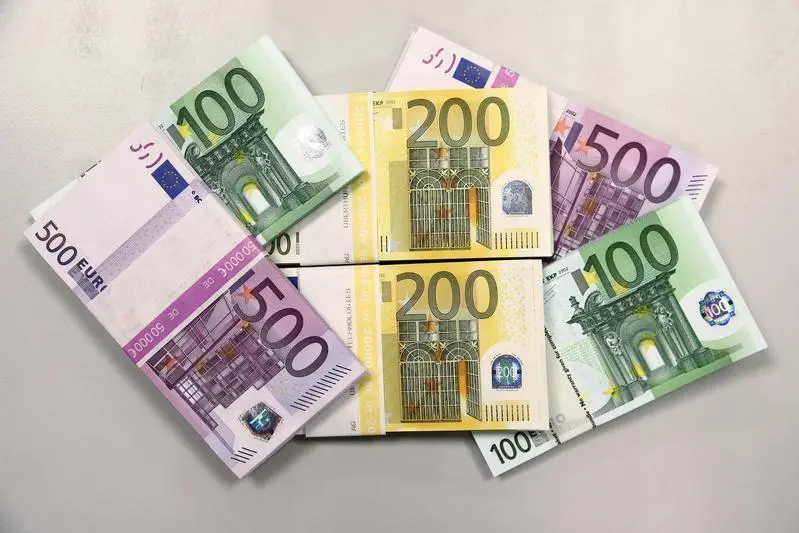PHOTO
The euro hit a seven-month peak against the dollar on Wednesday, as traders bet U.S. consumer prices data later in the day will keep the Federal Reserve on course to cut interest rates next month.
The euro rose as much as 0.3% to $1.1029, surpassing the high hit during the market turmoil last week and was trading at its strongest level since January 2. The currency was last up 0.25% at $1.1023.
The dollar eased against a swathe of currencies ahead of U.S. inflation data at 8:30 a.m. ET (1230 GMT), which is expected to show the Consumer Price Index (CPI) increased 0.2% in July, on a month-on-month basis, following a 0.1% decline a month ago.
"Traders are positioning for a weaker CPI number, which of course (poses) a risk that if the CPI comes in line or little bit with an upside surprise, the dollar is going to go strong again," said Volkmar Baur, an FX analyst at Commerzbank.
"If it surprises on the downside, it shouldn't be swaying the Fed in the direction of a 50-basis point cut because inflation is a lagging indicator and a somewhat weaker CPI wouldn't be a signal of an impending recession."
The dollar softened on Tuesday after data showed U.S. producer prices increased less than expected in July, pointing to moderating inflation pressures.
Traders had been widely expecting a rate cut in September before the producer price data, and ramped up bets for a super-sized 50 basis-point cut after the release to 56% from 53% a day earlier, according to CME Group's FedWatch Tool.
STERLING DIPS, KIWI SLIDES
Sterling slipped 0.2% to $1.2843 after data showed the rise in British consumer price inflation was smaller than expected in July as services prices - closely watched by the Bank of England (BoE) - rose less rapidly.
Financial markets priced in a 44% chance of a quarter-point BoE rate cut in September, up from 36% before the data was released.
"We would say it's still consistent with a stabilisation in inflation, not a further disinflation. We're looking for the BoE to be more cautious than the Fed and the ECB because it seems inflation in Great Britain is going to be a bit more stubborn and the economic cycle seems to be picking up again," Commerzbank's Baur added.
The kiwi fell as much as 1.2% after the Reserve Bank of New Zealand reduced the cash rate by a quarter point, its first easing since early 2020 and coming a year earlier than its own projections. The currency was last trading 1% weaker at $0.6019.
Meanwhile, Japanese Prime Minister Fumio Kishida's decision to not run for re-election in his party's leadership race next month had little effect on markets, analysts said.
The yen weakened slightly against the dollar, which was up 0.1% at 146.95 yen.
"Probably the impact on the economy and financial markets should be relatively limited because Mr. Kishida's policies, if I try to characterize them, are really wide ranging and not focused on specific themes," said Masayuki Kichikawa, chief macro strategist at Sumitomo Mitsui Asset Management.
"The big question would be who would be next. That will be more important."
The dollar eased against the Norwegian crown, falling 0.5% to a one-month low of 10.68 crowns, and dropped 0.6% against the Swedish crown to a two-month trough of 10.40 crowns.
(Reporting by Kevin Buckland in Tokyo and Sruthi Shankar in Bengaluru; Editing by Kim Coghill, Ana Nicolaci da Costa and Emelia Sithole-Matarise)





















